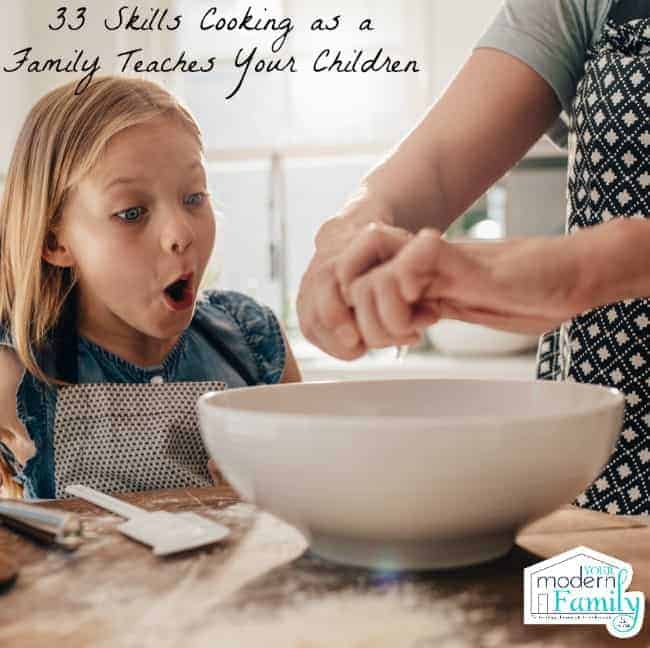This post may contain affiliate links. Please read our disclosure policy.
33 Skills Cooking as a Family Teaches Your Children
Cooking together is a fun (and free!) family activity that can teach your kids skills that they can carry on with them as they continue to grow and mature. Below are 33 of the most important life-lessons making a home-cooked meal can teach your children:
- Patience– Learning first-hand the attention to detail needed to correctly follow a recipe.
- Responsibility– It’s a lot of work to put a meal on the family dinner table every night, not to mention cleaning afterward (kids and dads – don’t let mom do the dishes on Mother’s Day!)
- Gratitude– Cooking is an opportunity to talk to kids about those who are less fortunate, and how lucky they are to have food on the table every night. More than 1 million children live in food-insecure households in the U.S.
- Independence– Teaching children easy-to-make meals will help them feel more comfortable and confident when cooking for themselves.
- Nutrition– Helping kids understand how to identify healthy vs. unhealthy foods, good fats vs. bad fats and processed foods will help them make healthy choices when they’re on their own.
- Teamwork– Making a meal as a family and divvying up tasks teaches kids how to support each other and work together toward a common goal.
- Math– Even the simplest of recipes requires a basic understanding of math, whether it be knowing the difference between a teaspoon and a tablespoon or doubling up on an ingredient. Cooking as a family is a fun way to apply math in a real-world setting.
- Science – Baking, unlike many dinner recipes, is an exact science. It’s also an opportunity to talk about chemistry, and the reasons why adding too much of one ingredient, or not enough of another, could completely change a recipe.
- Creativity– Cooking requires all kinds of creativity- from what spices to add, to how to plate the food in a unique and eye-catching manner. Cooking is a form of self-expression!
- Improvisation– Out of an ingredient? Sometimes cooking calls for quick thinking and improvisation skills. What can you substitute with what’s on hand?
- Portion Control– Allowing children to cook and serve themselves from the healthy options you cook helps them to gauge their own hunger levels and decide what they are actually hungry for.
- Pre-Planning– Cooking requires getting organized in advance; from grocery shopping to defrosting, to having the proper ingredients pulled out of the refrigerator or pantry at the right time. Pre-planning is a recipe for cooking success!
- Traditions– Cooking & eating family meals together teaches children traditions that they might one day pass on to their future families. Hey… even Taco Tuesday gives the family a tradition to look forward to.
- Listening Skills– Cooking and enjoying a family meal together allows children to develop healthy listening skills while participating in family conversations.
- Sharing Skills– Although sometimes a tough skill for our youngsters to learn, sharing is a social skill that will be important throughout their lives. Use cooking as an opportunity to promote healthy sharing and turn-taking behavior- sometimes you have to share that Mac & Cheese! Be sure to save some for Dad.
- Love– Cooking for others and being cooked for is an expression of love.
- Conversation Skills– The family table is a fantastic place to teach children basic conversation skills, and allows them to bring up what’s on their mind. Try starting out with, “Hey what would you like to talk about tonight?” or discussing current events- this is a chance to check in to see how they are filtering the world around them.
- Manners– Good manners will get you far in life! The dinner table is a place where you can model and encourage good manners as a family.
- History & Culture– Presenting foods into children’s cooking repertoire that are unique to a particular region is a great way to expose them both to your family history and other cultures from around the world.
- Structure– Preparing meals together can allow for a sense of structure in children’s lives- they know that you start cooking at 5:45 every day, and sit down for dinner at 6:30!
- Caretaking– Cooking for others teaches children good caretaking skills. When they are old enough to cook alone safely and Mom or Dad is sick or busy, they can step up and feed the family-and enjoy it while they do!
- Food Safety– Food-borne illness is a serious issue. According to the CDC, each year, 1 in 6 Americans gets sick by consuming contaminated foods or beverages. Teaching children proper food safety when cooking can help keep them safe and healthy.
- Openness to new experiences – This one is for all the parents who have a picky eater in the family. Involving your child in the meal prep process, whether it’s picking out food at the grocery store or helping to add ingredients when baking, allows them to become more interested in what is going on their plate. When they feel more attached to what’s being used to make the food, they may be more open to giving it a try.
- Sense Awareness– Cooking requires employing all five senses. How does the food:
- Smell… Burnt?
- Look… Cooked?
- Taste… Yummy?
- Sound… Sizzling?
- Feel…. Are those avocados ripe?
- Safety Awareness– Teaching knife skills and fire safety skills to older children encourages them to practice kitchen safety skills when on their own.
- Self-compassion– Cooking for yourself and feeding yourself when you are hungry teaches children that they are allowed to- and should- pay attention to their needs.
- Organization-Where’s the flour, salt, butter?? Cooking without being organized is always a recipe for disaster. Teaching children kitchen organizational skills makes cooking a pleasure and encourages them to practice organization in other aspects of their life (for example, with their toys.)
- Self-Discipline– Self-control is an important life skill- the ability to think before you act can help us reach our goals. In the sense of cooking, this is can be as simple as not eating all the chocolate chips when you want them because you have just the right amount for a recipe.
- Environmental Awareness– Cooking together offers the opportunity to talk to kids about environmental issues that are important to you. Some topics may include; food sourcing, recycling, reducing food waste, pesticides, and animal treatment issues.
- Cleaning Skills– Part of cooking is making sure you clean up after yourself! There is no time like the present to learn how to clean as you go.
- Reading– Allowing younger children to participate by reading the recipe gives them the satisfaction of feeling like they are being a big-time kitchen helper and teaches them new words. “Mommy, what does sauté mean?”
- Self-Reliance– Sending your young adults out into the world knowing how to cook makes them feel and be competent and ready for the challenges of adulthood.
- Decision-Making Skills- Putting teens in charge of family dinner allows them to practice decision-making skills. They will need to consider their family member’s tastes and interests, allergies, and the nutritional value of the meal before moving forward.
The next time you bring your kids into the kitchen for a day of cooking exploration, remember you’re teaching them about more than how to make a tasty treat they can use to impress their friends with one day!
Today’s guest post was written by Chef Paja-Dejur:
Chef Paja-Dejur Sanchez started her career at the early age of five, peeling onions in her mother’s five-star restaurant. The smells, tastes, sights and sounds of the professional kitchen inspired not only her career, but also her love of the science of cuisine. After years of being a successful restaurateur on the Gulf Coast of Florida, she now enjoys cooking with her two teenaged daughters and bringing her creativity and culinary background to develop unique recipes and cookbooks as the Executive Chef and Creative Manager at Ronco.
















Kitchen learning is always fun! Bringing your little ones into the kitchen gives them the opportunity to learn & practice new things, while enhancing their cooking skills. Thank you for sharing this useful post!